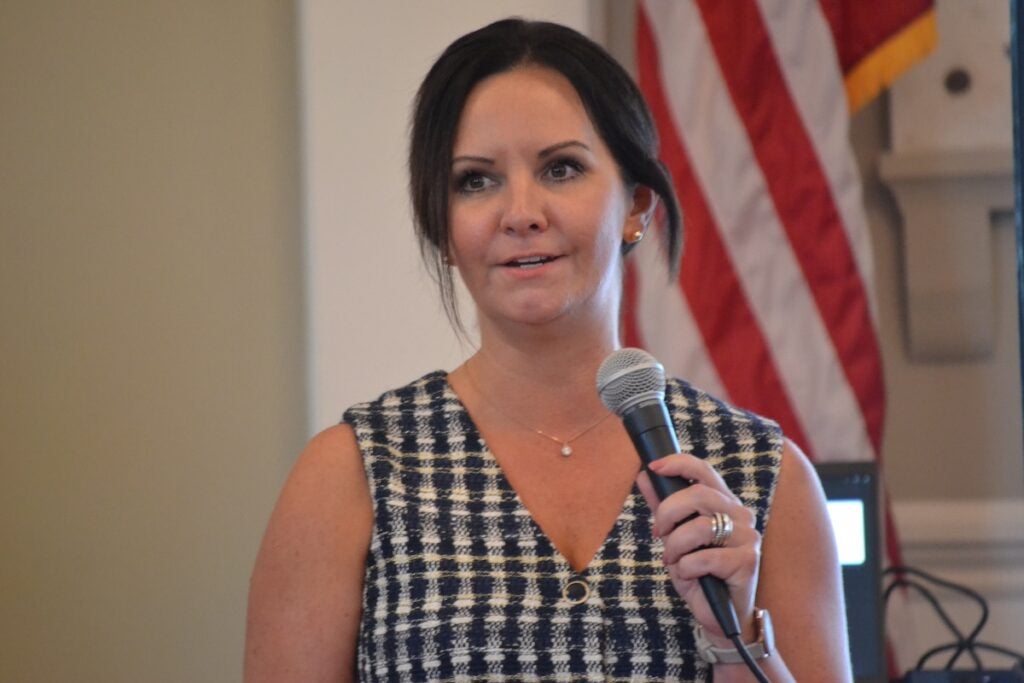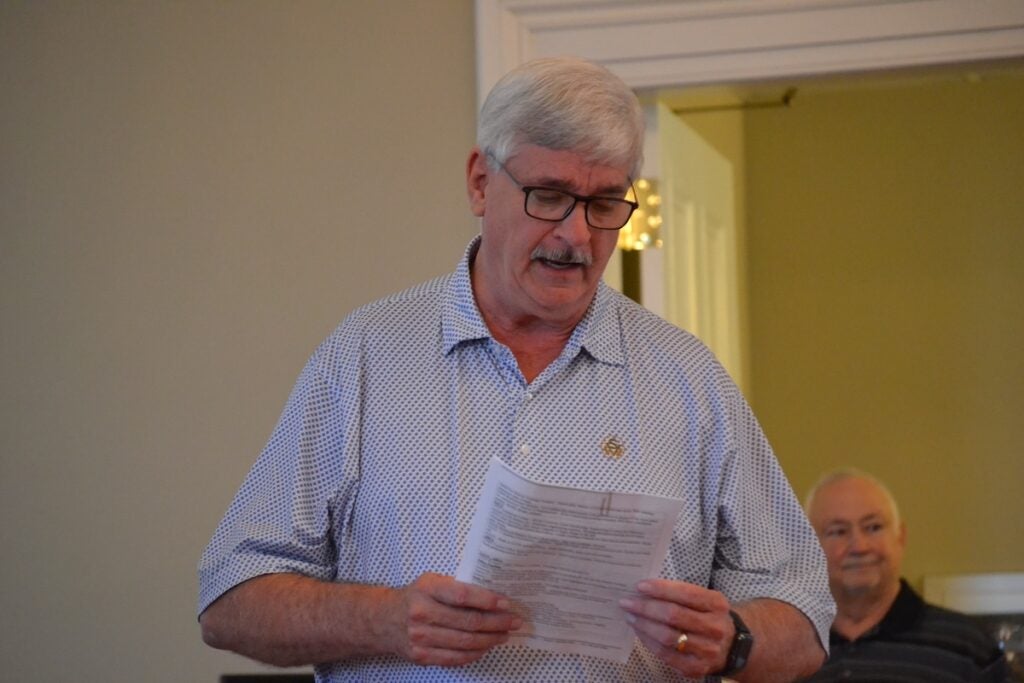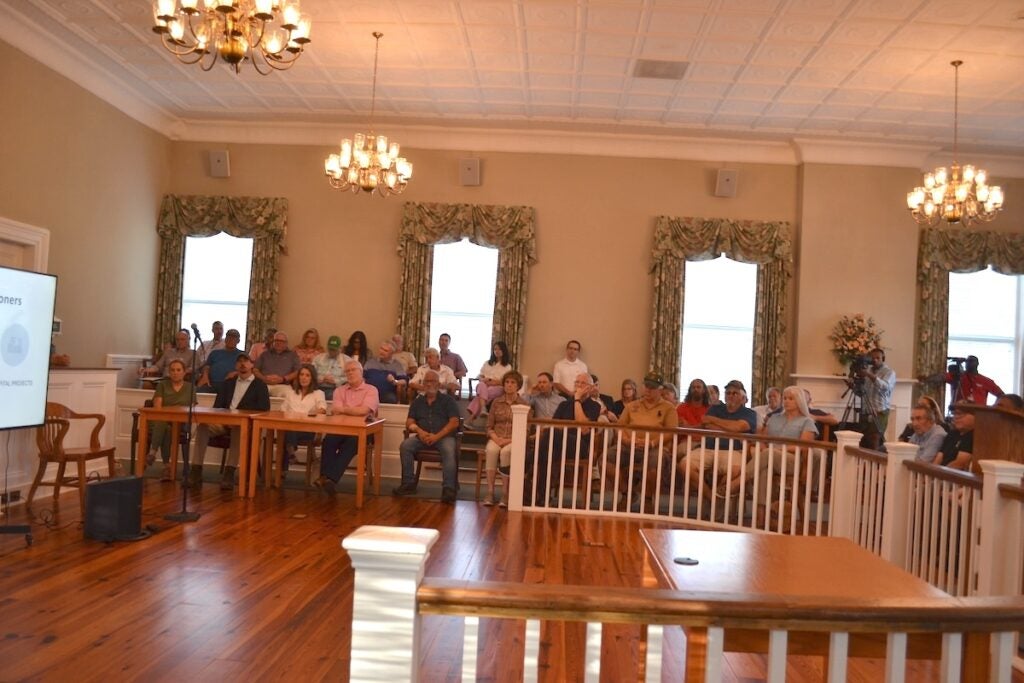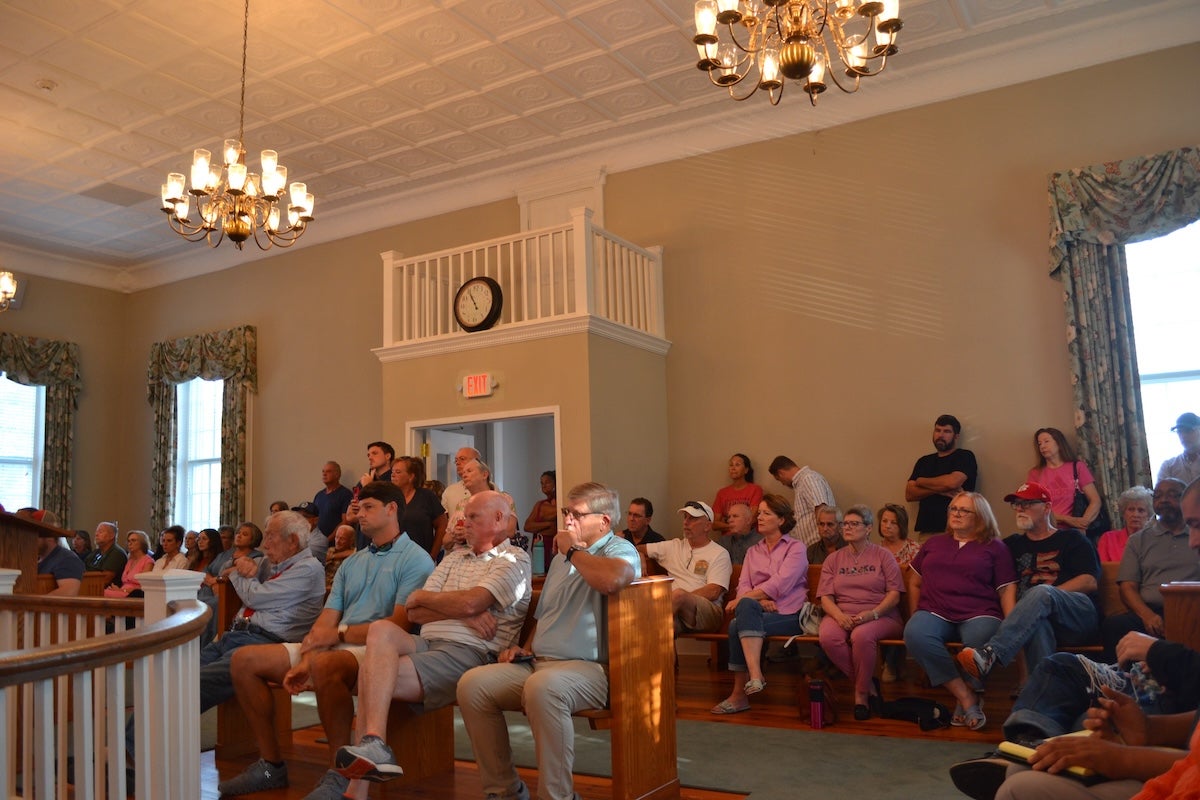The proposed data center in Appling dominated the conversation at the hour and 15 minute town hall Thursday night with Columbia County commissioners Michael Carraway and Alison Couch.
Before answering questions from community members, Couch gave a brief overview of the data center and why the county is considering the project.
“I would say the two biggest complaints that we receive as commissioners are traffic and property taxes,” Couch said. “Of course, we don’t like sitting in traffic. It’s very frustrating and property taxes are painful to be frank with you. Tax revenue generated from a data center is two parts, there’s real property tax paid and there’s tangible personal property tax that is paid on the equipment. The estimate projections that we’ve looked at could provide potential for significant tax savings for Columbia County homestead property tax owners. In having a solution to a problem that we hear a lot about, calls for consideration. This is something we have begun the consideration process on. It also has the potential for very low impact use of that land. That is also something that has been part of our consideration process in looking at this so far.”
When speaking, Couch emphasized that nothing has been decided, the county is looking at the possibility of a data center coming to Columbia County and seeking information about it at this time.
MORE: Proposed Ridge Road storage, Columbia Road solar farm, to return before Commissioners

“What is the status of this project? This project is being considered,” Couch said. “So of course, I just mentioned we are considering the tax savings for citizens, that is a consideration, but additional considerations to this project are the impact to water, the impact to power, the noise and light potential impacts, traffic impacts and more. I met with some citizens the other day and they brought to my attention some more detailed considerations. There’s a lot to look at with data centers and what all goes into that.”
Carraway added they are learning more facts each day, and all the information gathered will be taken into consideration before a decision is made.
“The steps that have been taken today so far have just been able to get us to where we can start understanding what a data center looks like,” Carraway said. “We do not have an end user. We don’t have any idea what kind of data center will be there. There’s a lot of questions about power, water and all that. We can’t answer and if anybody tries to answer it to you, they’re telling you lies, they don’t know because we don’t know. But when we know, that’s when all that will be taken into consideration, and we will be back out to inform the community.”
As for why the commission went ahead and rezoned the land without an end user, Couch said that Georgia Power required it so they could do a power study on the implications and impact a data center would bring to the area.
MORE: Augusta charter subcommittee disputes create tension

During citizen comments, Dewey Carey asked what would be different about the data center compared to ones in other counties “that have caused havoc within the United State and Georgia.”
He added that they don’t want Columbia County to be Social Circle or Fulton County, where there are data centers already. He wants Columbia County to stay Columbia County and be a place where his grandchildren can have a good quality of life.
“We would rather pay our property tax than to risk any gray areas about contamination, pollution in air and look at the location,” Carey said. “Yes, it’s by the interstate. I’ve got kids that go to Harlem Middle School. I don’t want turnout to be like these counties…that have data center (near schools and kids can’t go outside because of bad air quality)…I don’t want to be here 10 or 20 years down the road and my grandkids and their kids have gotten some type of physical ailment like cancer because of a money grab. I think that as commissioners ya’ll need to put a moratorium on this and think through this.”
Water concerns
One citizen, who spoke at the original zoning meeting for the property, asked about the water consumption for the data center. He said at that meeting it was estimated the data center would use up to six million gallons of water per day and when asked where that water would come from, was told the river. He asked if there was a way to prevent the use of wells on a property and whether the county could make the occupant use the river.
“I think it’s a two-part answer to your question,” said Cheney Eldridge, executive director for the Economic Development Authority of Columbia County who is spearheading the project. “The water piece, we did have to come up with a worst-case scenario of a county water user. There’s two different types of cooling systems that these data centers use. One is water and one is a glycol system. The majority of the users we’ve been talking to are the glycol system, they don’t use any more water than an office building does flushing toilets. Our goal really is to recruit one of those glycol cooling system users and there would not be any significant water at all.”

But, if a data center that does use heavy water is recruited, Eldridge said the developers and county water utility are working on a plan to run water to the facility, if needed, that would not impact citizens.
“We’re trying to create it where there is a totally different system and line that would run to this facility and would no tap into residential water,” Eldridge said.
Carey expressed concern about the glycol system because glycol is a “forever chemical” and asked would happen when it evaporates. If it evaporates and goes into the air and then gets into the water system, he said it will cause health issues for people.
Power concerns
There were also concerns about the power grid and whether it could support a data center. Stephen King, external affairs manager with Georgia Power, was at the meeting and addressed residents. He mentioned new rules and regulations that have been enacted for users over 100 megawatts. These include minimum contract lengths, a minimum of bill requirements and upfront collateral to protect residents from having to subsidize costs of the structure needed to support the large users.

Carey asked if right now Georgia Power could supply power for the project and how they would do it. King said yes, the company could do it.
“We have a 20 year look ahead we do every three years, and we’ve got plans in place to add 85 hundred megawatts,” King said. “The beauty of this project is it’s not going to happen tomorrow. The nice thing about these projects is they have…a slow ramp up. We have time to put the mechanisms in place that we’ve already been approved by the Public Services Commission to be able to serve the future use.”
Transparency concerns
There were comments with concerns regarding transparency with the project. Couch spoke about how the project was publicized, including being publicly advertised, signage was posted at the site, posted on the county website and posted about on social media. She said there was some public input at the public hearing at the Planning Commission before the item went to the Board of Commissioners.
Eldridge added that there is a website, https://www.whiteoak-techpark.com, that has information about the project.
“We’re not going to do anything to hurt our county,” Carraway said.
Next town hall
Another town hall will be held Monday, Aug. 25 from 6:30-7:30 p.m. in the Hardin Auditorium at the Evans Library. This town hall will feature District 1 Commissioner Connie Melear and District 4 Commissioner Alison Couch.











